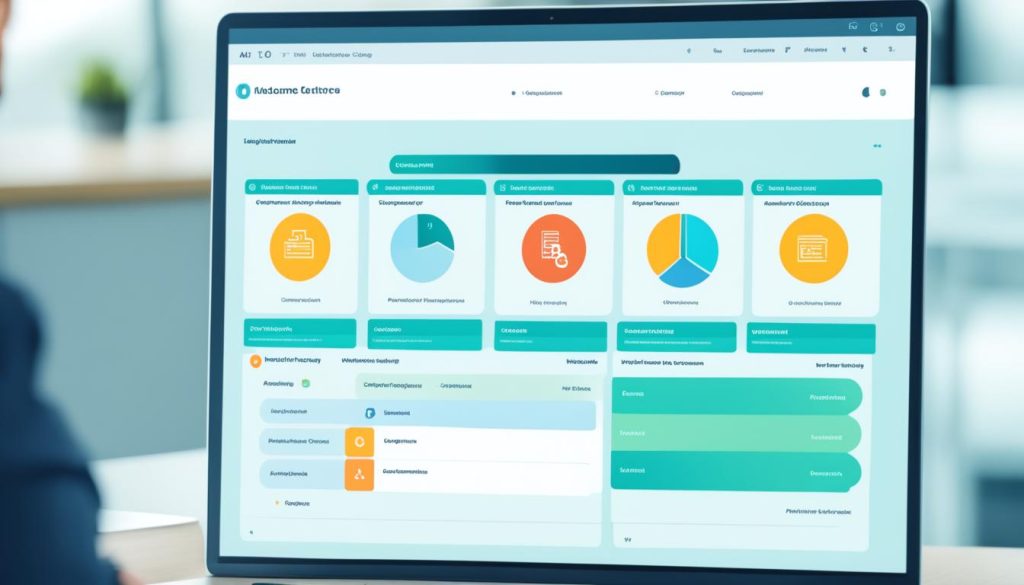Businesses are recognizing the need to invest in their employees’ continuous learning and development. In fact, 76 percent of employees are actively seeking career growth opportunities. By providing online learning platforms, businesses can support their employees’ career paths and enhance their skills. This article will explore the best online learning platforms for business professionals to boost their knowledge and drive success.
Key Takeaways:
- Investing in employee learning and development is essential for business success.
- Online learning platforms offer flexibility and accessibility for employees.
- Choosing the right learning management system is crucial for effective training.
- Incentivizing and celebrating learning can enhance employee engagement.
- Online learning empowers employees to advance their skills and knowledge.
Why Learning & Development is Important for Your Team
Learning and development initiatives not only demonstrate a company’s investment in its employees but also create a culture of continuous learning. By providing opportunities for employee training and development, businesses can equip their teams with the skills and knowledge needed to succeed in their roles.
Employees who have access to additional training and learning opportunities are more likely to stay with a company for a longer period of time. Investing in their growth and professional development courses not only boosts their job satisfaction but also strengthens their loyalty and commitment to the organization.
Furthermore, learning and development programs have a direct impact on business performance. According to research, organizations that prioritize employee development experience a 24 percent increase in their overall business margin.
Beyond the financial benefits, learning and development also play a crucial role in fostering diversity and inclusion efforts. By offering inclusive learning management systems and development opportunities, businesses encourage the promotion of women and people of color within the workplace, leading to a more inclusive and equitable work environment.

Investing in the development of your team is not just an expense; it’s an investment in the future success of your organization. A knowledgeable and skilled workforce is better equipped to tackle complex challenges, adapt to changing industry demands, and drive innovation.
The Benefits of Learning & Development for Your Team
Implementing effective learning and development strategies within your organization offers a range of benefits:
- Improved performance: Continuous learning ensures that employees stay updated with the latest industry trends, technologies, and best practices, enabling them to perform better in their roles.
- Enhanced employee engagement: Providing opportunities for learning and growth increases employee engagement and motivation, leading to higher levels of job satisfaction and productivity.
- Retaining top talent: By investing in employee development, businesses demonstrate their commitment to their team’s long-term career growth, making them more likely to retain top talent and reduce employee turnover.
- Increased adaptability: Learning and development equips employees with the skills to adapt to changing market conditions, embrace new technologies, and navigate business challenges.
- Attracting new talent: A reputation for prioritizing employee development can attract top talent who value continuous learning and personal growth opportunities.
By recognizing the importance of learning and development, businesses can create a positive work environment that fosters growth, innovation, and overall success.
Best LMS Software for Learning & Development in Your Organization
When it comes to learning and development in your organization, choosing the right Learning Management System (LMS) is crucial. There are several online learning platforms that cater specifically to businesses’ learning and development needs. Below, we have curated a list of some of the best LMS software options available:
- Udemy: An affordable training solution with a large catalog of online courses and options for long-term plans.
- SAP Litmos: Offers online learning and training for various aspects of business, with an intuitive authoring tool and gamification features.
- Lessonly: Provides online training and coaching for customer service, talent, and sales teams, with a user-friendly interface and diverse content options.
- Linkedin Learning with Lynda: Offers on-demand or on-the-job training content that can be easily implemented and scaled, using skill data from business profiles.
- Campus Learning Suite: A robust LMS platform that supports both teachers and learners, with features such as lesson plans and visual analysis.
- Schoox: A user-friendly platform that focuses on traditional, compliance-based training, with an emphasis on social learning and easy integration into existing HRIS.
- Docebo: An easily integrated corporate LMS that offers a learning suite for content creation and course authoring, along with access to industry-specific e-learning content.
- Learnerbly: Empowers employees with a personal learning budget and the autonomy to choose their learning path, curating resources based on individual interests.
These LMS platforms offer a wide range of features and cater to different organizational needs. From comprehensive training catalogs to user-friendly interfaces, you can find an LMS that suits your specific learning and development objectives.
To make an informed decision, consider factors such as your budget, scalability, user-friendliness, and customer support. Additionally, reading reviews and conducting thorough research on different LMS options can provide valuable insights into their strengths and limitations. You may also want to schedule a demo or consult with a sales representative to better understand how the platform aligns with your organization’s requirements.
By choosing the right LMS software, you can create a learning and development environment that nurtures the growth of your employees and drives success in your organization.
Incentivize and Celebrate Learning and Training
Incentivizing and celebrating additional training can greatly enhance the learning and development culture within an organization. By providing incentives and rewards, businesses can encourage their employees to embrace learning opportunities, resulting in increased engagement, retention, and productivity. One effective way to achieve this is by integrating with Cooleaf, a platform that specializes in incentivizing learning and fostering a culture of continuous improvement.
Cooleaf offers a range of features that can help drive learning engagement and incentivize training. With Cooleaf, businesses can create customized programs that provide rewards and recognition for employees who actively participate in training activities. These rewards can range from tangible incentives such as gift cards or company swag to intangible rewards like public recognition or career development opportunities.
By incorporating Cooleaf into their learning and development initiatives, businesses can create a gamified experience that motivates employees to engage in additional or refresher training. The platform allows for seamless integration with existing learning management systems, making it easy to track and reward employees for their learning achievements.
Additionally, with Cooleaf’s social features, employees can share their learning experiences with their peers, fostering a sense of community and collaboration. This encourages knowledge sharing and peer-to-peer learning, further enhancing the overall learning and development culture within the organization.

By incentivizing and celebrating learning and training, businesses not only create a positive and engaging learning environment but also reinforce the value placed on continuous learning and professional growth.
Cooleaf’s data analytics capabilities enable businesses to measure the impact and effectiveness of their training programs. By gathering insights into employees’ learning behaviors and preferences, organizations can continuously improve their training initiatives and tailor them to meet the specific needs and interests of their workforce.
Ultimately, by incentivizing and celebrating learning, businesses can demonstrate their commitment to employee development, resulting in a more engaged and skilled workforce. Through the integration of platforms like Cooleaf, organizations can build a culture that values and prioritizes learning, helping employees thrive and driving overall success.
Learning Management System Basics: Functions and Features eLearning Pros Must Know
A Learning Management System (LMS) is an essential tool for managing and delivering online learning content. It offers a wide range of functions and features that facilitate the creation, delivery, and tracking of training programs. With an LMS, eLearning professionals can streamline their training processes and provide engaging learning experiences for their audience.
Key LMS Functions
- Course Management: LMS platforms allow eLearning professionals to easily create, organize, and update courses. They can structure content, manage enrollment, and track learners’ progress.
- User Management: LMSs provide features to manage user accounts, including registration, login credentials, and user profiles. This enables personalized learning experiences and progress tracking for each learner.
- Assessment and Grading: LMSs offer assessment tools to create quizzes, assignments, and exams. They also automate grading and generate reports to evaluate learners’ performance.
- Reporting: LMS platforms generate comprehensive reports on learners’ progress, completion rates, and assessment results. These analytics help eLearning professionals monitor the effectiveness of their training programs.
- Collaboration Tools: LMSs often include features for communication and collaboration, such as discussion forums and live chat. These tools foster interaction and knowledge sharing among learners and instructors.
Key LMS Features
- Content Authoring: Some LMS platforms provide built-in authoring tools that allow eLearning professionals to create interactive and engaging learning materials without the need for external software.
- Gamification: Many LMSs incorporate gamified elements like badges, leaderboards, and points to enhance learner engagement and motivation.
- Mobile Accessibility: With the increasing use of mobile devices, LMSs that offer responsive design or mobile apps allow learners to access training materials anytime and anywhere.
- Integration Capabilities: LMS platforms may integrate with other tools and systems, such as customer relationship management (CRM) software or human resource information systems (HRIS). This streamlines data exchange and enhances the overall learning experience.
To illustrate the various functions and features of an LMS, here’s an image showcasing how it can enhance online learning:

By leveraging the capabilities of a well-designed LMS, eLearning professionals can create and deliver high-quality training programs that meet the diverse needs of their audience. These systems empower organizations to optimize their online learning initiatives and drive continuous professional development.
Choosing the Right Learning Management System for Your Business
When it comes to selecting a Learning Management System (LMS) for your business, there are several important factors to consider. The right LMS can have a significant impact on your organization’s training effectiveness and overall success. To make an informed decision, take into account the following key considerations:
Specific Training Needs
Begin by assessing your company’s specific training requirements. What skills and knowledge do your employees need to develop? Identify the areas where additional training can have the most impact on your business goals.
Budget
Consider your budget for implementing an LMS. Evaluate the costs associated with different platforms, including setup fees, subscription charges, and any additional features or customization options.
Scalability
Don’t just think about your current needs, but also anticipate future growth. Select an LMS that can accommodate your expanding workforce and increasing training demands.
User-Friendliness
An intuitive and user-friendly interface is crucial for successful adoption and engagement. Look for an LMS that is easy to navigate and offers a seamless learning experience for your employees.
Customer Support
Consider the level of customer support provided by the LMS vendor. You’ll want a reliable and responsive support team to assist with any technical issues or questions that may arise during the implementation and usage of the system.
Once you have a clear understanding of your organization’s needs and requirements, it’s time to dive into research and comparisons. Read LMS reviews from trusted sources and gather insights from businesses that have already implemented LMS solutions. This will help you gain a better understanding of the pros and cons of each platform.
Additionally, many LMS providers offer the option to schedule a demo or consult with a sales representative. Take advantage of these opportunities to see the platform in action and ask any questions you may have. A demonstration can help you assess whether the LMS aligns with your organization’s unique training goals and workflows.
Making an informed decision about the right LMS for your business is crucial to maximizing the impact of your training initiatives. Take the time to evaluate your needs, research and compare different options, and seek out expert advice. By choosing the right LMS, you can create a comprehensive and effective learning environment that drives employee development and contributes to the overall success of your business.

The Benefits of Online Learning for Business Professionals
Online learning offers a wide range of advantages for business professionals, making it an increasingly popular choice for professional development. Whether it’s enhancing skills, staying up-to-date with industry trends, or fitting learning into busy schedules, remote learning platforms have revolutionized the way professionals acquire knowledge and grow in their careers.
One of the key advantages of online learning is the flexibility it provides. Business professionals can access training materials from anywhere, at any time, without being tied to a physical location. This flexibility allows individuals to learn at their own pace and fit their learning around their existing commitments, whether it’s work, family, or personal interests.

The accessibility of remote learning platforms is another significant benefit. With just an internet connection, business professionals can access a vast array of courses and resources, empowering them to acquire new skills and knowledge without the limitations of geographic location. Remote learning breaks down barriers and opens up opportunities for professionals to learn from industry leaders and experts regardless of where they are located.
Cost-effectiveness is yet another advantage of online learning. With remote learning, businesses can save on travel, accommodation, and venue costs associated with traditional in-person training. Professionals can access high-quality courses and resources at a fraction of the cost, making professional development more accessible and affordable for individuals and organizations alike.
Self-paced learning is also a remarkable feature of online learning. Business professionals can learn at their own speed, allowing them to fully grasp and absorb the content without feeling rushed. This personalized approach to learning ensures maximum understanding and retention of the material, enabling professionals to apply their newfound knowledge effectively in their roles.
Online learning has revolutionized professional development by offering flexible, accessible, cost-effective, and personalized learning experiences for business professionals. Remote learning platforms have made it easier than ever to enhance skills, stay up-to-date, and achieve professional goals.
Conclusion
Investing in the best online learning platforms for business is crucial for supporting employee growth, enhancing skills, and driving overall success. By prioritizing learning and development, businesses not only foster a culture of continuous improvement but also increase employee retention and productivity. By providing access to top e-learning websites and virtual training tools, businesses can create a workplace that values and supports employee learning, unlocking the full potential of their teams.
Learning and development have become increasingly important in today’s fast-paced business environment. By embracing online learning platforms, businesses can ensure their employees stay up to date with industry trends and acquire new skills. This commitment to employee growth not only benefits individual professionals but also drives the overall success of the organization.
Whether through incentivizing training or selecting the right learning management system, businesses can create an environment that promotes continuous learning. By embracing the importance of learning and development, companies can provide their employees with the tools they need to thrive and stay ahead in today’s competitive market.




No comments! Be the first commenter?